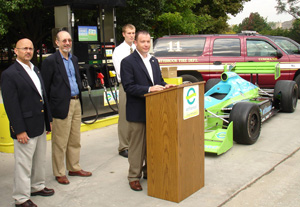 Kansas flex-fuel motorists can take advantage of bargain prices while pumping up the local economy at an E85 grand opening in Manhattan, Kansas on Friday. E85 will be available for $1.85 a gallon at the Farmers Cooperative Association in Manhattan.
Kansas flex-fuel motorists can take advantage of bargain prices while pumping up the local economy at an E85 grand opening in Manhattan, Kansas on Friday. E85 will be available for $1.85 a gallon at the Farmers Cooperative Association in Manhattan.
The first 50 cars to fill up with E85 will receive an IndyCar® Series #17 Team Ethanol diecast car. Free hot dogs and pop will be available to consumers throughout the entire promotion.
 Next week, on Tuesday, Kum & Go, the Iowa Corn Growers Association and the Iowa Corn Promotion Board are partnering for an ethanol promotion event in Johnston.
Next week, on Tuesday, Kum & Go, the Iowa Corn Growers Association and the Iowa Corn Promotion Board are partnering for an ethanol promotion event in Johnston.
 “This event is meant to celebrate ethanol use in Iowa and to ramp up excitement for ISU’s homecoming week,” said Jerry Main, a corn grower and chairman of the Usage and Production Committee at Iowa Corn. “This event marks a great set of anniversaries: Iowa State is celebrating 150 years and Iowa Corn has been promoting ethanol for 30 years. I am also glad to see the partnership between Iowa Corn and Kum & Go benefiting Iowa consumers.”
“This event is meant to celebrate ethanol use in Iowa and to ramp up excitement for ISU’s homecoming week,” said Jerry Main, a corn grower and chairman of the Usage and Production Committee at Iowa Corn. “This event marks a great set of anniversaries: Iowa State is celebrating 150 years and Iowa Corn has been promoting ethanol for 30 years. I am also glad to see the partnership between Iowa Corn and Kum & Go benefiting Iowa consumers.”
In Iowa, 75 percent of consumers use ethanol blends, and the market is growing for E85 fuel in flexible fuel vehicles.


 “Switching to the new labels is voluntary but it enables fuel retailers to capitalize on growing consumer awareness and the national brand-building activities that are being spearheaded by EPIC,” said White. “More and more consumers are seeking out ethanol-enriched fuel and this branding program will help consumers find it simply by looking for the brand image that will be consistent from pump to pump and from city to city across Illinois — and, eventually, across the entire United States.”
“Switching to the new labels is voluntary but it enables fuel retailers to capitalize on growing consumer awareness and the national brand-building activities that are being spearheaded by EPIC,” said White. “More and more consumers are seeking out ethanol-enriched fuel and this branding program will help consumers find it simply by looking for the brand image that will be consistent from pump to pump and from city to city across Illinois — and, eventually, across the entire United States.” A
A 

 U.S. Senator Charles Grassley (R-IA) was among those attending a a grand opening and open house this week at Magellan Midstream Partners’ biodiesel blending facility in Mason City, Iowa.
U.S. Senator Charles Grassley (R-IA) was among those attending a a grand opening and open house this week at Magellan Midstream Partners’ biodiesel blending facility in Mason City, Iowa. “This is a perfect example of cooperation between energy companies — of companies working arm in arm instead of in competition with one another to solve a problem,” said Grassley.
“This is a perfect example of cooperation between energy companies — of companies working arm in arm instead of in competition with one another to solve a problem,” said Grassley. Gusts of energy from
Gusts of energy from  Ohio has a lot of it, and now, one company has a breakthrough way of using it.
Ohio has a lot of it, and now, one company has a breakthrough way of using it.  Chicago-based biodiesel refinery builder Benefuel, Inc. will build the world’s first industrial-scale biodiesel refinery that uses a novel solid catalyst to convert low-grade fats and vegetable oils into biodiesel. The 10-million-gallon plant is to be built in Seymour, Indiana in conjunction with Seymour Biofuels.
Chicago-based biodiesel refinery builder Benefuel, Inc. will build the world’s first industrial-scale biodiesel refinery that uses a novel solid catalyst to convert low-grade fats and vegetable oils into biodiesel. The 10-million-gallon plant is to be built in Seymour, Indiana in conjunction with Seymour Biofuels. Minneapolis-based National Wind has acquired Romuld Wind Consulting… a wind resource assessment and energy analysis firm from Grand Forks, North Dakota. The new division, called National Wind Assessments, will help the company work with customers and and current development projects.
Minneapolis-based National Wind has acquired Romuld Wind Consulting… a wind resource assessment and energy analysis firm from Grand Forks, North Dakota. The new division, called National Wind Assessments, will help the company work with customers and and current development projects.